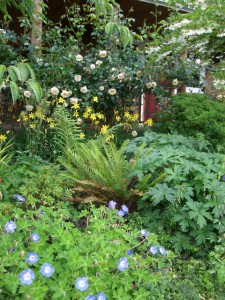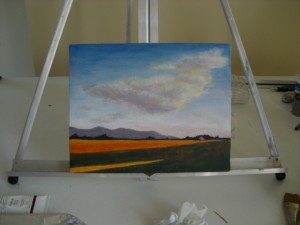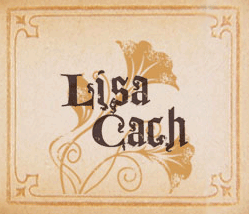I recently tried an experiment on myself, to see if information overload was stymieing my creativity, like the experts claim it can.
As a writer, I’m at home all day, mostly alone, and yet most of the time I seem to get very little done on either creative projects, or larger home projects. I fritter away my day answering email, browsing online, cooking, doing dishes, doing laundry. In the evenings I devote my attention to my husband, and sometimes sit beside him as he watches TV. On many evenings, and on the weekends, we spend time with friends.
Meanwhile, my beloved garden goes un-weeded, un-trimmed, and un-watered; my writing remains unfinished; my files of photos for artistic inspiration grow and yet I do very little art. And yet, these things are – I claim – very important to me. More important than the Internet, dishes, laundry, or TV.
Why do I tread water where I am, accomplishing little, rather than swim towards one of the many enticing shores of finished novel, painted picture, tended garden? Why, moment by moment, do I make choices that do not move me towards my goals?
I went online – where else? – to look for some answers. One part of the answer seems to be in the seductive lure of online social connection. Scott Belsky at the99percent points out:
“The need to be connected is, in fact, very basic in Maslow’s hierarchy of needs, the psychological theory that explains the largest and most fundamental human desires. Our need for a sense of belonging comes right after physical safety. We thrive on friendship, family, and the constant affirmation of our existence and relevance. Our self-esteem is largely a product of our interactions with others.
It is now possible to always feel loved and cared for, thanks to the efficiency of our “comment walls” on Facebook and seamless connection with everyone we’ve ever known.”
So, my frittering away time on Facebook or writing emails has a solid basis in human psychological need. No wonder it’s so hard to resist.
In addition to the social seduction of the Internet, there’s also the temptation of online information, be it articles to read or forums to follow, or news to keep abreast of. David Levy, a professor at the Information School at the University of Washington, has gotten a lot of attention lately for coining the phrase ‘popcorn brain’ to describe what happens to us when our brain gets so used to the excitement of being online that it can’t deal with the slowness of everyday real life. The UW iSchool now even has a program on Information and the Quality of Life .
I love inputting fresh information into my popcorn brain, so the Internet is definitely part of my problem.
How about TV? When I’m cooking or unloading the dishwasher, or eating a meal, I usually have the TV on ‘for company.’ Could this innocuous input, to which I barely pay attention, be impinging on my ability to be creative and get things done, too? I usually (usually) turn it off when I’m done with my task, but perhaps it has been doing more harm than I thought. All that noise and voices and visual stimulation: it’s all information, too, that my brain is processing.
Susan Reynolds wrote this about information overload and creativity at Psychology Today:
“…the incubation of ideas needed for true creativity (incubation that ideally occurs just below your conscious awareness) becomes increasingly difficult when information just keeps pouring in.
If you are allowing yourself to be besieged by an influx of information, you are more likely to have trouble making the creative leap required for original thought… Our brain needs time to subconsciously integrate new information with existing information and make novel connections or identify hidden patterns. Being bombarded impinges on your ability to think creatively.”
And then there’s this further confirmation, from no less than Albert Einstein:
“I lived in solitude in the country and noticed how the monotony of a quiet life stimulates the creative mind.”
Was it really the pleasant distractions of the Internet and TV that were stopping me from getting things done?
It was time for an experiment.
My husband was going camping for three days, and I would be left completely alone at home with no planned visitors, and no scheduled lunch dates or appointments. I decided I would not turn on the TV during his absence, and I would severely limit Internet time. No phone calls or texts would be allowed, either. If I wanted to read, it would have to be a book (books require long, focused attention, in contrast to reading online). I would not set goals for what I wanted to get done during the experiment. Instead, I’d let time flow and see what happened.
Left alone in the quiet house, I fidgeted. Then I started to putter: doing dishes, making lunch. I looked out the window at the garden and started cataloging what needed doing. I went online to an art website and looked up how to paint a landscape… and then logged off.
‘Real life’ without TV, without the company of friends or husband, with no phone and with only limited Internet time did indeed feel slow. As empty moments ticked by, though, I started to feel what we did as kids, when there was nothing to do: first bored, but then… restless. Energized. Creative. Without Internet and TV, and without the pleasant distraction of the company of other people, I had to come up with my own entertainment. I had to find something to do.
Pretty soon, I had six blank canvasses laid out on an old sheet on the patio, and I was priming them with gesso. While they dried, I got out my never-used hedge trimmer and went to work on the overgrown shrubs. Painted on another coat of gesso. Cleaned up and read a book, then did another coat of gesso.
Next day, I started a painting of a landscape. Weeded half the garden. Watered all of it. Read some more. Slipped on my resolve and briefly turned on the TV, but the jabbering noise and flashing images repulsed me, and I shut it off.
On the third day I finished the landscape painting and weeded the remainder of the garden. By the end of the final day, when my husband came home, I was sitting in an Adirondack chair on the patio, staring up at the trees and watching the chickadees, and letting my mind drift from thought to thought, idea to idea. And I was not bored.
*
That was two weeks ago. In the time since, I’ve watched a little TV at night, but each time have wondered why I bothered. Since my experiment, I’ve come to believe that the TV’s jabbering and flashing images have a subtle, pernicious influence on my creative energies, and steal away my initiative. Yes, I will still watch TV, but I’m much more deliberate about it now: it has to be something that I really, truly want to watch, and I’ll only watch it in the evening — not during the day, when I could/should be doing other things.
The Internet is a more difficult seducer to deal with. I need to go online for promotional work for my books, for research for my writing and art, and, yes, to connect with friends. But I don’t need to spend as much time online as I do. I don’t need to read so many blogs, or surf through so many random sites, enjoyable as that is.
Social connection is pleasant and easy online, as Scott Belsky points out above, but that easiness means those interactions are relatively light and shallow. Sometimes a glancing contact with a friend is all that we want, and that’s okay. It’s not worth spending hours on, however. Let me save those hours for face to face contact, or writing a long, heartfelt email.
In the two weeks since the experiment, I’ve painted another landscape, and worked halfway through a third. I’m reading – and enjoying — an Anthony Trollope novel (a slow-moving book becomes much more entertaining when you don’t have so many fast-paced distractions), and I’ve revised the storyline for “Foxfire,” the sequel to “Wake Unto Me.”
I won’t say that minimizing Internet and TV use is fun or painless. But that’s why it works: the discomfort of boredom stimulates action.
They say that we have a finite amount of willpower that we can expend every day, in pursuit of our goals. That meager willpower was never enough to get all my projects done, and habits changed. Too many goals, not enough willpower. Directing that willpower towards the one goal of reducing distractions has, however, provided the space and energy for everything else I want to do, no additional willpower required.
I can live with that.




